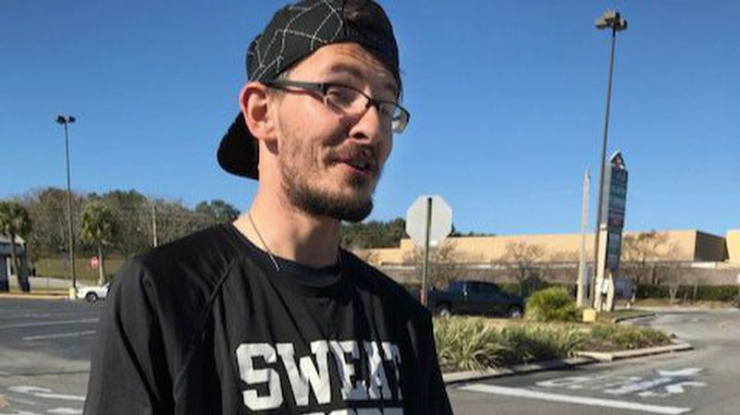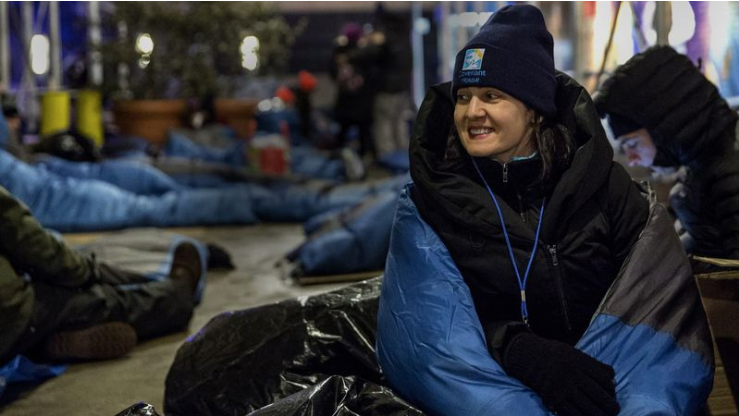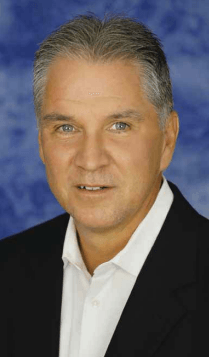Leadership Broward Foundation Presents a Lifetime Achievement Award to Plantation Resident James Gress
Jill Sharpe • October 31, 2016
Jim Gress signed on to serve runaway and homeless youth at Covenant House Florida even before the Fort Lauderdale beachfront facility opened. He began as an assistant team leader in August of 1985, one month before the first teen arrived at the facility, and rose, through the ranks to the executive director post he holds today.
Source: Plantation Town Times

Chris Jacobsen, 26, participated in the Point in Time count of homeless people earlier this week. He told workers in the parking lot of the Aldi grocery in Leesburg that he has been homeless for eight years and that it's "very hard out here" for someone who is gay. (Lauren Ritchie/Orlando Sentinel) You won’t find them snoring on a park bench. They’re not at intersections waving a cardboard sign asking for money. Oh, no. They’re too afraid for such public exposure. The homeless youth of today can be found sleeping on a friend’s couch, trading sex for a “safe” place to spend the night or huddled in a car parked in what they hope is a safe spot. They hang out at Starbucks, not Lake Eola Park. “They make an effort to fit in. They go to places where they can fit in,” said Shelley Lauten, CEO of the Central Florida Commission on Homelessness. “They’re just part of the crowd.” Young people get really skilled in blending like chameleons, as workers counting the homeless learned on Tuesday when they found six teenagers living at the Orlando International Airport. Meet the hidden homeless. “They’re embarrassed — it’s humiliating. Your family doesn’t want you, your mom is drug-addicted, your grandfather raped you, you’re in danger,” said Denise Burry, executive director of Forward Paths for homeless youth. Figuring out how many “youths” — ages 13 to 24 — have no safe place to sleep is tricky. Still, folks who work with the homeless tried this week during the annual “Point in Time” count conducted across Central Florida and the rest of the country. The results of the snapshot won’t be out for months, but the experts know the number will be rising. Consider that the number of homeless youth in Atlanta tripled from 2015 to 2016, and Seattle’s King County saw its count jump more than 700 percent between 2016 and 2017. A local study pinpointed 268 homeless youth in a single night in October 2017 in Orange, Seminole and Osceola counties, but Lauten said the number is “way under-counted.” No count has been attempted in Lake, but Burry’s program helps roughly 60 of these notoriously hard-to-track kids at any given time, leaving at least some others hiding out. Nearly every homeless young person tells a story that includes this single factor: instability at home. Folks, we are not talking about teens having a spat with mommy and daddy running away from their nicely landscaped suburban home. This is a real thing. Parents kick them out because of their sexuality — some 35 percent are gay, lesbian, transgender or something else that freaks out parents. Mom and Dad are in and out of jail, a drug-addicted sibling steals, another is violent and drinks, an uncle sexually abuses them, mental-health meltdowns are a way of life. On their own, these typically uneducated kids about 30 percent with children of their own find that housing is sky-high, jobs are hard to get, food is scarce and they can’t get to work without transportation unless they’re on a bus route. Sex becomes a way to get what they need. Roughly 30 percent got too old to be in foster care and were dumped into society to live on their own. Last year, the University of Florida calculated that with Florida’s minimum wage of $8.10, a full-time worker could afford $421 a month for rent and utilities. Hahaha. Is it made of glue and pallets? Does it have a roof? A typical two-bedroom apartment costs $1,075. The teen would have to work 102 hours a week to pay for shelter. That’s what happened to a brother and sister in Leesburg whose parents threw them out. They both have part-time jobs and the sister is a senior at Leesburg High. They sleep in their car because they can’t pull together the several thousand dollars it takes to get an apartment. Twenty years ago, a kid kicked out at 18 could stay with a friend and kickstart adult life without many roadblocks. Not now. Is this the America in which you want to live? Does it make you proud? Together, Orange, Osceola and Seminole have about 100 beds in various categories for young people. In Lake, Forward Paths houses 20 youth at any given time. Covenant House, a mission for homeless young people in Orlando, had 665 homeless young people call last year, asking for help to get on their feet, said Maria Shorkey, CEO of the group’s Orlando operation. Hundreds are on the waiting list. Here’s what’s embarrassing: Covenant House in Central Florida is subsidized by the one in Fort Lauderdale because the charity can’t raise enough money here. Shorkey said she doesn’t know why because it’s a “genius” investment. Youths plucked from homelessness quickly have a far smaller chance of being homeless as an adult. And then, there is Lake County, which is spending $7.8 million to build a new air-conditioned shelter for dogs and cats but has none — air-conditioned or otherwise — for humans. Is that messed up or what? Central Florida has it priorities misplaced. One fairly quick and cheap way agencies could begin helping these homeless young people is a program other states have tried using what they call “host homes.” These are families who undergo, say, 40 hours, of training in what to expect and provide up to 21 days of temporary shelter while the various agencies figure out how to help. All the groups who help the homeless could get in on this with little effort. That’s not a fix. It’s a first step toward getting children off the street. But first, someone must care enough to put together a database of volunteers. Lritchie@orlandosentinel.com Source: Orlando Sentinel

Covenant House holds an annual "sleep out" to raise money for the homeless youth it shelters. (Courtesy of Covenant House) Covenant House Florida, a nonprofit agency for homeless and at-risk youth, has received a record $1 million donation from City Furniture - money that will help the charity provide food, blankets, crisis counseling and other aid to teens and young adults who survive on the streets of Orlando. “This is really great news for our youth,” said Maria Shorkey, chief operating officer for the Orlando campus of Covenant House Florida. “This is the largest corporate donation ever to Covenant House Florida, and it will help our agency expand facilities and programming.” The contribution, which comes during National Homeless Awareness Month, kicks off a campaign by the charity to raise $10 million statewide to address what national authorities have called a “hidden epidemic” of homeless teens and young adults. In Orlando, the donation will help fund an outreach program that offers food, blankets, hygiene supplies, basic first aid, crisis counseling, information and bus tickets to homeless youth. The donation coincides with City Furniture opening its first of three new showrooms in Orlando. In South Florida, Covenant House Florida will relocate from its aging beachside shelter in Fort Lauderdale to a new facility that will be named after Kevin Koenig, late brother of Keith Koenig, CEO of City Furniture. “Knowing that so many local teens are living in the shadows, we hope to be a catalyst for helping Covenant House Florida expand its vital work,” Koenig said. “Early on, my brother Kevin saw the organization’s potential to create a sense of home, safety and comfort for young people struggling to survive on the streets.” In the 1980s, Kevin Koenig, who founded Waterbed City, decided to donate to Covenant House Florida when the company had a great year. The Koenig brothers later expanded their firm as City Furniture, now South Florida’s top-selling furniture retailer, and expanded their partnership with Covenant House Florida. Keith Koenig chaired the agency’s board of directors in the late 1990s, during the planning and opening of the Orlando shelter. After his death, in 2001, Keith Koenig established the Annual Kevin Koenig Memorial Covenant House Cup Golf and Fishing Tournament, which has netted more than $1.2 million for the charity over the years. Covenant House Florida has helped more than 38,500 young people since 1983. But the need has outpaced resources — the agency estimates there are more than 7,000 children and youth in the state each night who lack safe shelter, many of whom have been exposed to sex trafficking. S ource: Orlando Sentinel ksantich@orlandosentinel.com, 407-420-5503, @katesantich. Please consider supporting local journalism by purchasing a digital subscription to the Orlando Sentinel.

